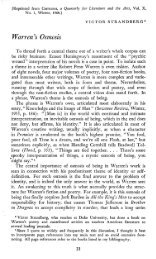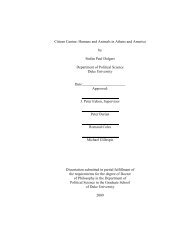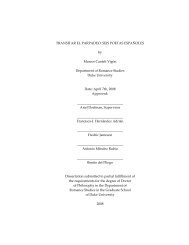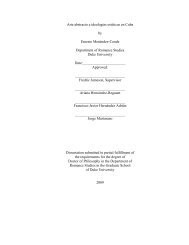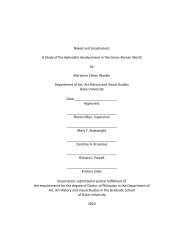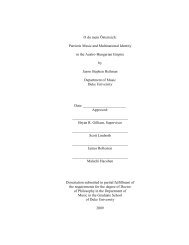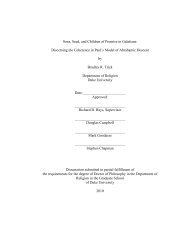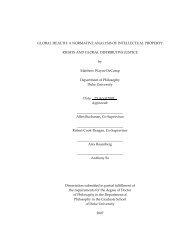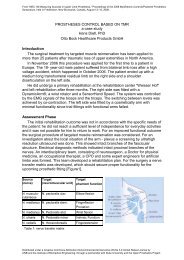View/Open - DukeSpace - Duke University
View/Open - DukeSpace - Duke University
View/Open - DukeSpace - Duke University
You also want an ePaper? Increase the reach of your titles
YUMPU automatically turns print PDFs into web optimized ePapers that Google loves.
and “provide imaginative resources for urgent and intensely local struggles” (Martin 2003a, 21).<br />
Nonetheless, China’s government censorship protocols banning homosexual content extend to<br />
the internet. The Golden Shield censorship project, also labeled “The Great Firewall,” and<br />
numerous State Regulations on pornography explicitly prohibit online references to<br />
homosexuality (Zheng 2008). These repressive policies have restricted the virtual LGBT<br />
presence, forcing many tongzhi websites to shut down and silencing discussion about<br />
homosexuality (Fletcher 2008; Jiang 2011). 16<br />
Despite – or perhaps because of – these restrictions, tongzhi find novel ways to<br />
circumvent censorship and share information about sensitive issues through fiction, often using<br />
metaphorical language and cultural allusions (Mo 2013). Along these lines, Comrade Literature<br />
provides insight into gay struggles stemming from discriminatory policies and cultural biases in<br />
contemporary China (Jiang 2005). These narratives frequently contain realistic and even<br />
(auto)biographical elements, serving an essential communicative function in addition to its<br />
aesthetic aspects as an artistic literary product (Cristini 2005). However, it is important to note<br />
that Chinese fiction concerned with the imbrications of homoerotic desire and political discourse<br />
actually traces back to the early 20 th century, before the tongzhi genre was established. As<br />
literary scholar David Der-Wei Wang has pointed out, political novels such as Jiang Gui’s ( 姜 贵 )<br />
Double Sun 《 重 阳 》 (1927) pre-date Bai Xianyong’s Crystal Boys (1983) by several decades,<br />
yet have clear homoerotic overtones (Wang 1998, 105). 17 Nonetheless, this thesis investigates<br />
16 In June 2011, Douban, one of China’s more liberal social networking sites and once a popular online platform for<br />
the tongzhi community, received government pressure to delete all posts with LGBT content. This action<br />
underscores the State’s repressive stance against discussion of homosexuality on the internet (Jiang 2011).<br />
17 Double Sun 《 重 阳 》 (1927) was a huge political novel on the first Chinese Communist Revolution and tells the<br />
intricate relationship between two young men with different political backgrounds during this radical period. This<br />
novel definitely addresses the homoerotic dimension of Chinese political imaginary in the early 1900s (Wang 1998;<br />
Pers. Comm. 2012).<br />
Introduction | 14



